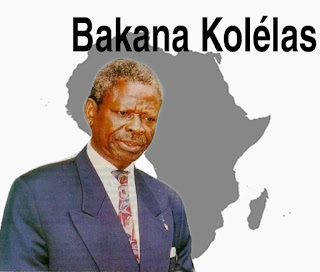Bakana Kolélas belongs to a class of prominent political figures in the Republic of Congo (Congo-Brazzaville).
Bakana Kolélas was President of the Congolese Movement for Democracy and Integral Development (MCDDI) which was one of the strongest opposition parties in the country.
Personal Life
Bakana Koléla's attempts to become president of Congo did not succeed but that did not take anything from the fact that he was a major influencer as far as Congolese politics was concerned.
Early Life of Bakana Koléla
Kolélas was born at Mboloki in the Kinkala District of Congo-Brazzaville in 1933. After he completed his secondary education, he joined the Union for the Defense of the Interests of Africans(UDDIA) in 1958.
He worked for a while as Secretary-General of the Ministry of Foreign Affairs in 1961 under the government of Congo’s first president Albert Youlou. When Youlou was booted out of power in 1963 and Alphonse Massemba-Débat stepped in, Kolélas was chosen to serve as Minister of Foreign Affairs, but he turned down this juicy offer and instead suggested David Charles Ganaofor the position.
In September 1963, Kolélas was arrested and detained for a month before he was released. Again in January 1964 he was arrested, but released at the request of Prime Minister Pascal Lissouba. Immediately he was released, he exiled himself to Kinshasa, Democratic Republic of the Congo, and there founded an opposition newspaper called La Résistance. This became a tool he used to challenge the government.
Perhaps he felt a newspaper alone would not bring the change he desired, so in November1969, Kolélas planned a coup to unseat President Marien Ngouabi but to his utter disappointment, it was not successful. Worse still, he was arrested before he could make his escape.
He was thereafter sentenced to death but was later pardoned and set free on New Year’s Day in 1972. One would think that after narrowly escaping death because of his involvement in a coup, he would distance himself from anything politics. But in August 1978, he was re-arrested in connection with another coup plot, though he was fortunate again to escape capital punishment and was released in 1980.
After some period of keeping a low profile as a green snake under the grass, Kolélasfounded a political party, the Congolese Movement for Democracy and Integral Development (MCDDI)in 1989.
When Parliamentary elections took place in June 1992, he got elected into the National Assembly to represent the Goma Tsé-Tsé constituency. He also stood as a presidential candidate later in August for the presidential elections where he lost in the second round of voting to Pascal Lissouba. A period of conflict followed the 1992 elections. It became more severe in 1993 leaving about 2000 people dead.
The conflict was between the government and the Kolélas-led opposition coalition. It only reduced drastically after President Lissouba and Kolélas publicly reconciled in June 1994.
Civil war
In July 1994, he was elected as Mayor of the capital city, Brazzaville. When the Civil war broke out in 1997, Kolélas served as the President of the National Mediation Committee and was then appointed Prime Minister by President Lissouba. This was a smart move by the president to bring in the opposition in order to secure his position. But the Sassou Nguesso-led opposition didn't fall for the bait as it rejected all the offers of government appointments that came.
Eventually, it was Nguesso that won the power struggle with help from Angolan troops. Lissouba and Kolélas were forced to flee the country into exile, leaving Sassou Nguessoto effectively take over the government. Kolélas stayed away from Congo-Brazzavillefor eight years, mostly residing in the United States.
cases on Kolélas
On the 4th of May, the year 2000, Kolélas while still in the United States, was sentenced to death in absentia by a Congolese court. The charges against him included illegal arrests, rape, and abductions. However, he was given special amnesty in 2005 which enabled him to return to Congo to attend the burial ceremony of his wife, Jacqueline.
Nguesso said the amnesty was based on humanitarian grounds. Having been away for eight long years, upon receiving the news of his forthcoming return, his supporters got very excited and somehow things got out of hand, leading to a clash with the police.
In 2007, two years after his return, he was once again elected into the National Assembly. This was the last significant political office he held. Kolélas who has been suffering from Alzheimer's disease was hospitalized in Paris in late2007.
Again in 2009, he spent long months in Paris for medical treatment but this time, he succumbed to death in the early hours of 13th of November2009, he was 76 years old.



